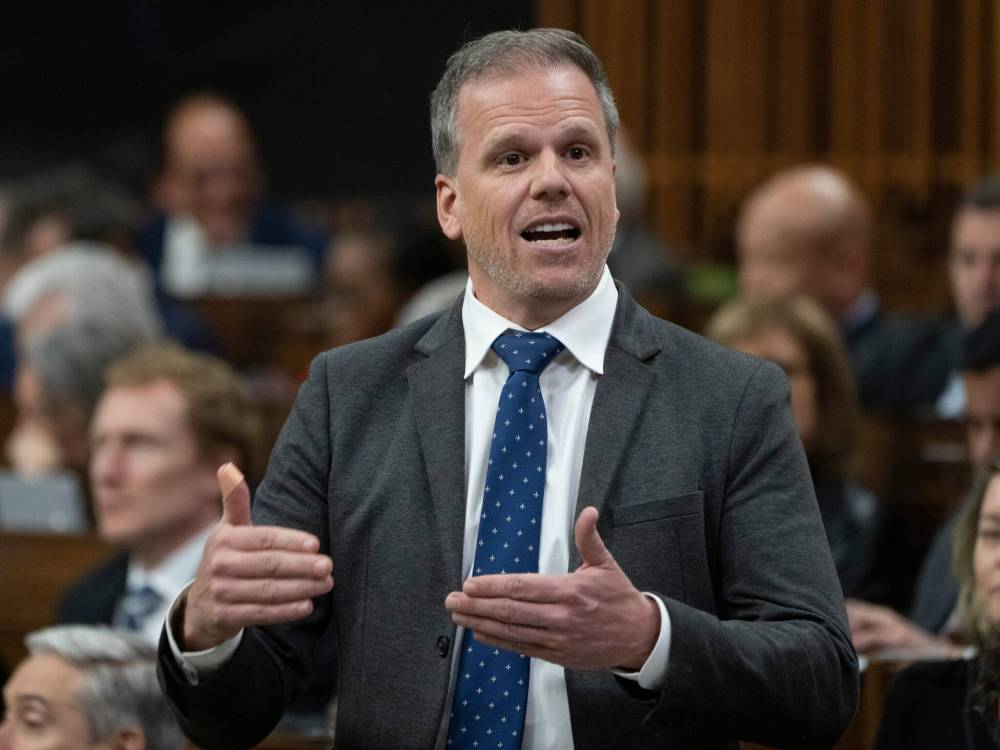Ottawa delivers millions to reduce sexually transmitted, blood-borne infections in province
Advertisement
Read this article for free:
or
Already have an account? Log in here »
To continue reading, please subscribe:
Monthly Digital Subscription
$0 for the first 4 weeks*
- Enjoy unlimited reading on winnipegfreepress.com
- Read the E-Edition, our digital replica newspaper
- Access News Break, our award-winning app
- Play interactive puzzles
*No charge for 4 weeks then price increases to the regular rate of $19.00 plus GST every four weeks. Offer available to new and qualified returning subscribers only. Cancel any time.
Monthly Digital Subscription
$4.75/week*
- Enjoy unlimited reading on winnipegfreepress.com
- Read the E-Edition, our digital replica newspaper
- Access News Break, our award-winning app
- Play interactive puzzles
*Billed as $19 plus GST every four weeks. Cancel any time.
To continue reading, please subscribe:
Add Free Press access to your Brandon Sun subscription for only an additional
$1 for the first 4 weeks*
*Your next subscription payment will increase by $1.00 and you will be charged $16.99 plus GST for four weeks. After four weeks, your payment will increase to $23.99 plus GST every four weeks.
Read unlimited articles for free today:
or
Already have an account? Log in here »
Hey there, time traveller!
This article was published 15/11/2023 (753 days ago), so information in it may no longer be current.
Manitoba harm-reduction and community health programs are getting millions in federal funding to address “unacceptable” rates of sexually transmitted and blood-borne infections in the province.
On Wednesday, federal Liberal Health Minister Mark Holland announced nearly $6 million for seven community-based projects to support people living with HIV and other STBBI infections, to promote testing and prevent new infections.
“It’s part of our efforts to combat, and really end, hepatitis, HIV and other sexually transmitted and blood-borne infections,” Holland said in an interview ahead of the announcement at Nine Circles Community Health Centre in Winnipeg.

“Being able to identify where these illnesses are present, and being able to take work to get people the treatment that they need, and to talk about prevention, and be engaged in prevention is critically important to our overall goal of trying to eliminate these conditions.”
Holland described HIV infection rates in Manitoba, particularly in vulnerable populations, as deeply concerning and entirely unacceptable.
Between 2018 and 2022, the number of people diagnosed annually with HIV in Manitoba jumped by 83 per cent. According to statistics provided by the province Wednesday, there were 196 new cases in 2022.
In the first six months of 2023, there were 134 new cases of HIV.
While hepatitis C infections have been decreasing, Manitoba also had the highest rate of new cases in the country as of 2019 (the best available data).
In 2022, there were 533 new cases of hepatitis C diagnosed, down from 593 in 2021. So far, public health has reported 452 new cases this year.
“That’s why the action that is being taken… is critically important,” Holland said. “What we know is that the conditions and the causes are really unique to each community.”
Ensuring front-line service providers have the resources to directly address the needs of the communities they work with is the “best way forward to turn around these trends,” Holland said. “Right now, we’ve been moving in the wrong direction.”
Nine Circles received $1.1 million to continue programming through its HIV-STBBI collective impact network and to expand self-testing services.
“We see a lot of first-time testers emerging as a result of this funding. Our additional role then is to make sure people understand how to connect people to care if they are testing reactive, or positive, for HIV,” executive director Mike Payne said.
It is becoming increasingly difficult for primary care providers to meet rising demand for HIV care, he added.
Payne said he expressed the need for more help in a Wednesday meeting with Holland and Manitoba Health Minister Uzoma Asagwara.
“We can test a lot more people and that’s important, but as we find those folks who are living with HIV, if we can’t successfully land them into care, we’re not getting where we need to be,” Payne said, adding he’s hopeful the two levels of government are committed to solutions.
Three of the programs funded Wednesday are specifically intended to reduce HIV and hepatitis C among people who use injection drugs and pipes.

The Canadian Press file photo
Federal Health Minister Mark Holland announced $14.4 million for 15 community-based projects to support people living with HIV, hepatitis C and other STBBIs in Manitoba and Saskatchewan Wednesday.
Jennifer Wood, a senior policy analyst at the Southern Chiefs’ Organization, said about three-quarters of people referred to the province’s HIV program are Indigenous.
“The numbers are staggering,” she said. “That was extremely upsetting for us and we knew that we needed to do something about it.”
The political organization launched its own harm-reduction and land-based healing program in January to serve its 34-member First Nations.
It has provided free harm-reduction supplies to SCO nations and community members, raised public awareness on STBBIs, assisted health-care providers to deliver culturally safe care, and a “senior harm-reduction program specialist” will join the organization later this month, Wood said.
“We know the stats, we know that our relatives are disproportionately affected by toxic drug poisoning, by overdose events and over-represented in terms of HIV and STBBIs,” Wood said. “We need to do everything we can to advocate for our citizens and to keep our people safe.”
The opening a supervised consumption site as part of a harm-reduction strategy is a priority for the organization, Wood said. The NDP government has committed to doing so in downtown Winnipeg.
“We know that the drug supply is toxic, that there is poison drugs out there and people are dying because of it,” Wood said. “Unfortunately, the majority of people dying are our people and we want to make sure they survive.”
The topic was was expected to be discussed during a Wednesday meeting with Asagwara, Holland said. However, the federal law maker could not commit to providing the necessary exemption to open a safe injection site in Winnipeg.
“Making sure that all action we take is evidence-based and that we work in collaboration with provinces is what I can offer right now,” Holland said.
“We’re deeply concerned about the opioid crisis and the drug crisis that we have in this country that’s very related to poor mental health.”
danielle.dasilva@freepress.mb.ca
History
Updated on Wednesday, November 15, 2023 5:31 PM CST: Updates to final version, adds photo.





